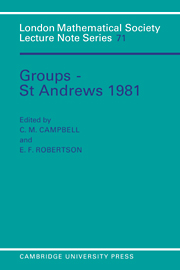Book contents
- Frontmatter
- Contents
- Preface
- Twenty-five years of Groups St Andrews Conferences
- Original Introduction
- 1 An elementary introduction to coset table methods in computational group theory
- 2 Applications of cohomology to the theory of groups
- 3 Groups with exponent four
- 4 The Schur multiplier: an elementary approach
- 5 A procedure for obtaining simplified defining relations for a subgroup
- 6 GLn and the automorphism groups of free metabelian groups and polynomial rings
- 7 Isoclinisms of group extensions and the Schur multiplicator
- 8 The maximal subgroups of the Chevalley group G2(4)
- 9 Generators and relations for the cohomology ring of Janko's first group in the first twenty one dimensions
- 10 The Burnside group of exponent 5 with two generators
- 11 The orientability of subgroups of plane groups
- 12 On groups with unbounded non-archimedean elements
- 13 An algorithm for the second derived factor group
- 14 Finiteness conditions and the word problem
- 15 Growth sequences relative to subgroups
- 16 On the centres of mapping class groups of surfaces
- 17 A glance at the early history of group rings
- 18 Units of group rings: a short survey
- 19 Subgroups of small cancellation groups: a survey
- 20 On the hopficity and related properties of some two-generator groups
- 21 The isomorphism problem and units in group rings of finite groups
- 22 On one-relator groups that are free products of two free groups with cyclic amalgamation
- 23 The algebraic structure of ℵ0-categorical groups
- 24 Abstracts
- 25 Addendum to: “An elementary introduction to coset table methods in computational group theory”
- 26 Addendum to: “Applications of cohomology to the theory of groups”
- 27 Addendum to: “Groups with exponent four”
- 28 Addendum to: “The Schur multiplier: an elementary approach”
14 - Finiteness conditions and the word problem
Published online by Cambridge University Press: 07 September 2010
- Frontmatter
- Contents
- Preface
- Twenty-five years of Groups St Andrews Conferences
- Original Introduction
- 1 An elementary introduction to coset table methods in computational group theory
- 2 Applications of cohomology to the theory of groups
- 3 Groups with exponent four
- 4 The Schur multiplier: an elementary approach
- 5 A procedure for obtaining simplified defining relations for a subgroup
- 6 GLn and the automorphism groups of free metabelian groups and polynomial rings
- 7 Isoclinisms of group extensions and the Schur multiplicator
- 8 The maximal subgroups of the Chevalley group G2(4)
- 9 Generators and relations for the cohomology ring of Janko's first group in the first twenty one dimensions
- 10 The Burnside group of exponent 5 with two generators
- 11 The orientability of subgroups of plane groups
- 12 On groups with unbounded non-archimedean elements
- 13 An algorithm for the second derived factor group
- 14 Finiteness conditions and the word problem
- 15 Growth sequences relative to subgroups
- 16 On the centres of mapping class groups of surfaces
- 17 A glance at the early history of group rings
- 18 Units of group rings: a short survey
- 19 Subgroups of small cancellation groups: a survey
- 20 On the hopficity and related properties of some two-generator groups
- 21 The isomorphism problem and units in group rings of finite groups
- 22 On one-relator groups that are free products of two free groups with cyclic amalgamation
- 23 The algebraic structure of ℵ0-categorical groups
- 24 Abstracts
- 25 Addendum to: “An elementary introduction to coset table methods in computational group theory”
- 26 Addendum to: “Applications of cohomology to the theory of groups”
- 27 Addendum to: “Groups with exponent four”
- 28 Addendum to: “The Schur multiplier: an elementary approach”
Summary
The purpose of this note is a generalization of the solution of the word problem for recursively presented simple groups. The results are pretty trivial but, like other easy observations in this field, they may have useful applications. Most of the work is accomplished by the choice of an appropriate terminology, some of which has been introduced in, and. Most ordinary decision algorithms consist of a reduction procedure to a normal form that yields the desired decision by a directly discernible typographical property. Thus triviality is reduced to zero length in free groups and the solutions of the word problem for individual finite or nilpotent groups are also of this kind. A uniform solution for a class Ḵ of groups extends to a solution for finitely presented residually-Ḵ-groups. That finite relatedness is indispensible here, is shown by examples of finitely generated, recursively related, residually finite groups with unsolvable word problems. On the other hand there are structural features of the lattice of normal subgroups that, in conjunction with a recursive presentation, will yield a decision algorithm for the word problem, while the class of all finite presentations with that property is not recursively enumerable. Finiteness of the normal lattice is a typical example and so is the property of being nearly critical in a sense that will be made precise below.
- Type
- Chapter
- Information
- Groups - St Andrews 1981 , pp. 244 - 251Publisher: Cambridge University PressPrint publication year: 1982
- 1
- Cited by

